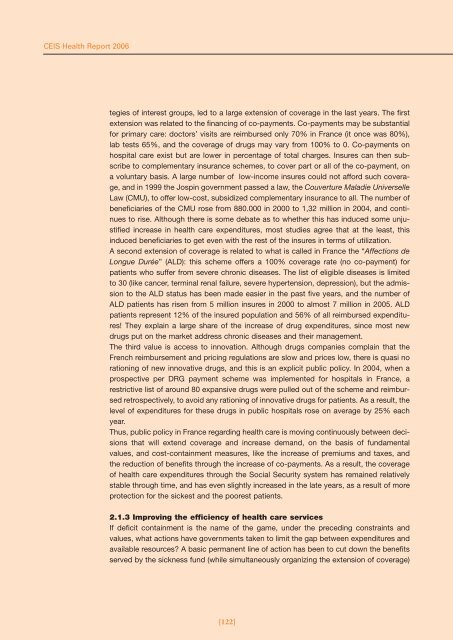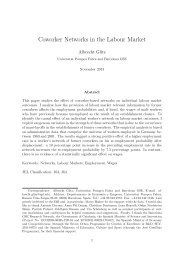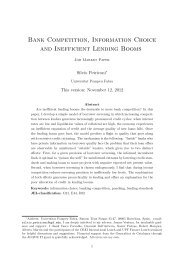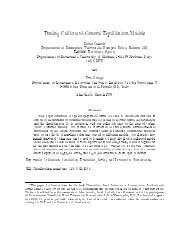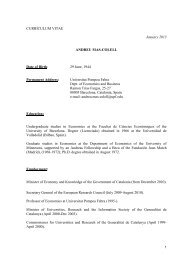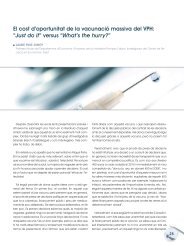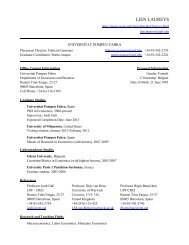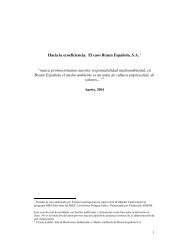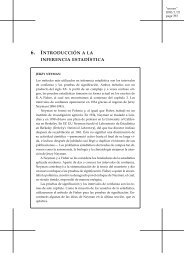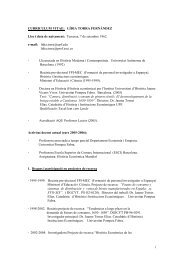Chapter 2
Chapter 2
Chapter 2
You also want an ePaper? Increase the reach of your titles
YUMPU automatically turns print PDFs into web optimized ePapers that Google loves.
CEIS Health Report 2006<br />
tegies of interest groups, led to a large extension of coverage in the last years. The first<br />
extension was related to the financing of co-payments. Co-payments may be substantial<br />
for primary care: doctors’ visits are reimbursed only 70% in France (it once was 80%),<br />
lab tests 65%, and the coverage of drugs may vary from 100% to 0. Co-payments on<br />
hospital care exist but are lower in percentage of total charges. Insures can then subscribe<br />
to complementary insurance schemes, to cover part or all of the co-payment, on<br />
a voluntary basis. A large number of low-income insures could not afford such coverage,<br />
and in 1999 the Jospin government passed a law, the Couverture Maladie Universelle<br />
Law (CMU), to offer low-cost, subsidized complementary insurance to all. The number of<br />
beneficiaries of the CMU rose from 880.000 in 2000 to 1,32 million in 2004, and continues<br />
to rise. Although there is some debate as to whether this has induced some unjustified<br />
increase in health care expenditures, most studies agree that at the least, this<br />
induced beneficiaries to get even with the rest of the insures in terms of utilization.<br />
A second extension of coverage is related to what is called in France the “Affections de<br />
Longue Durée” (ALD): this scheme offers a 100% coverage rate (no co-payment) for<br />
patients who suffer from severe chronic diseases. The list of eligible diseases is limited<br />
to 30 (like cancer, terminal renal failure, severe hypertension, depression), but the admission<br />
to the ALD status has been made easier in the past five years, and the number of<br />
ALD patients has risen from 5 million insures in 2000 to almost 7 million in 2005. ALD<br />
patients represent 12% of the insured population and 56% of all reimbursed expenditures!<br />
They explain a large share of the increase of drug expenditures, since most new<br />
drugs put on the market address chronic diseases and their management.<br />
The third value is access to innovation. Although drugs companies complain that the<br />
French reimbursement and pricing regulations are slow and prices low, there is quasi no<br />
rationing of new innovative drugs, and this is an explicit public policy. In 2004, when a<br />
prospective per DRG payment scheme was implemented for hospitals in France, a<br />
restrictive list of around 80 expansive drugs were pulled out of the scheme and reimbursed<br />
retrospectively, to avoid any rationing of innovative drugs for patients. As a result, the<br />
level of expenditures for these drugs in public hospitals rose on average by 25% each<br />
year.<br />
Thus, public policy in France regarding health care is moving continuously between decisions<br />
that will extend coverage and increase demand, on the basis of fundamental<br />
values, and cost-containment measures, like the increase of premiums and taxes, and<br />
the reduction of benefits through the increase of co-payments. As a result, the coverage<br />
of health care expenditures through the Social Security system has remained relatively<br />
stable through time, and has even slightly increased in the late years, as a result of more<br />
protection for the sickest and the poorest patients.<br />
2.1.3 Improving the efficiency of health care services<br />
If deficit containment is the name of the game, under the preceding constraints and<br />
values, what actions have governments taken to limit the gap between expenditures and<br />
available resources? A basic permanent line of action has been to cut down the benefits<br />
served by the sickness fund (while simultaneously organizing the extension of coverage)<br />
[122]


